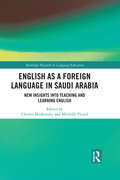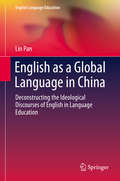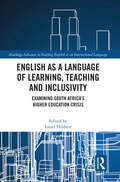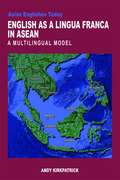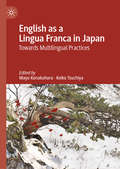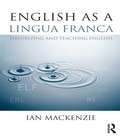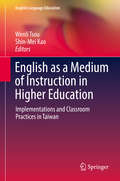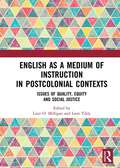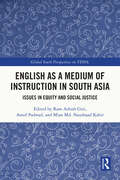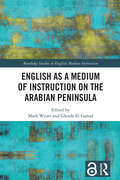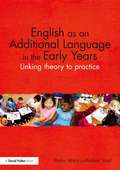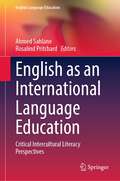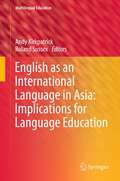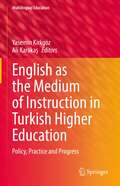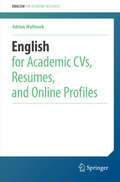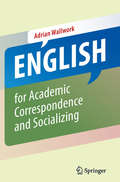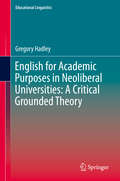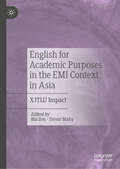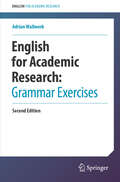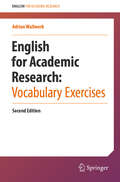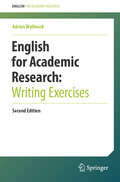- Table View
- List View
English as a Foreign Language in Saudi Arabia: New Insights into Teaching and Learning English (Routledge Research in Language Education)
by Christo Moskovsky Michelle PicardEnglish as a Foreign Language in Saudi Arabia: New Insights into Teaching and Learning English offers a detailed discussion of key aspects of teaching and learning English in the Saudi context and offers a comprehensive overview of related research authored or co-authored by Saudi researchers. It provides readers with an understanding of the unique cultural, linguistic, and historical context of English in Saudi Arabia—with a focus on the principal factors that may influence successful teaching and learning of English in this country. Uniquely, the book looks separately at issues pertaining to in-country English learning and learners, and those pertaining to in-country English teaching and teachers. The volume also explores issues concerning Saudi learners and teachers in overseas contexts. Lastly, the book touches on the future of English as a Foreign Language and TESOL in Saudi Arabia and its implications for the field.
English as a Global Language in China
by Lin PanThis book offers insight into the spread and impact of English language education in China within China's broader educational, social, economic and political changes. The author's critical perspective informs readers on the connections between language education and political ideologies in the context of globalizing China. The discussion of the implications concerning language education is of interest for current and future language policy makers, language educators and learners. Including both diachronic and synchronic accounts or China's language education policy, this volume highlights how China as a modern nation-state has been seeking a more central position globally, and the role that English education and the promotion of such education played in that effort in recent decades.
English as a Language of Learning, Teaching and Inclusivity: Examining South Africa’s Higher Education Crisis (Routledge Advances in Teaching English as an International Language Series)
by Liesel HibbertHibbert explores South Africa’s higher education crisis utilising case studies and first-hand experiences with English as the language of instruction. The historical overview provides a framework with which to understand the complicated nature of using English as a language of instruction in South Africa, past and present. Student narratives are presented to illustrate mainly breakthroughs, but also challenges. An overview is provided, of imported English teaching methodologies and how they have emerged and developed in the local educational system over decades. It is demonstrated how these methodologies relate to socio-economic and political events and trends at each juncture. By applying defamiliarisation as a research method of investigation, students’ translanguaging struggles are recorded and discussed, both pre-pandemic and in the pandemic period. The experiences of non-monolingual English-speaking staff and students, and of local English/African language bilinguals is foregrounded, as they are by far the majority in South African higher education and schools. The relevance of the experiences and learning paths of those staff and students is enhanced. This book aids lecturers across disciplines and English language facilitators in the improvement of English acquisition curricula through exposure to arguments, case studies and learning path narratives in this volume, and prompts and inspires researchers to develop further theories and experiments in their own context.
English as a Lingua Franca in ASEAN
by Andy KirkpatrickThe lingua franca role of English, coupled with its status as the official langu
English as a Lingua Franca in Japan: Towards Multilingual Practices
by Keiko Tsuchiya Mayu KonakaharaThis edited book examines the phenomenon of English as a Lingua Franca (ELF) in the Japanese context, using multilingualism as a lens through which to explore language practices and attitudes in what is traditionally viewed as a monolingual, monocultural setting. The authors cover a broad spectrum of topics within this theme, including language education policies, the nature of ELF communication in both academic and business settings, users’ and learners’ perceptions of ELF, and the pedagogy to foster ELF-oriented attitudes. Teaching and learning practices are reconsidered from ELF and multilingual perspectives, shifting the focus from the conformity to native-speaker norms to ELF users’ creative use of multilingual resources. This book is a key resource for advancing ELF study and research in Japan, and it will also be of interest to students and scholars studying multilingualism and World Englishes in other global contexts.
English as a Lingua Franca: Theorizing and teaching English
by Ian MackenzieEnglish as a Lingua Franca: Theorizing and Teaching English examines the English used among non-native speakers around the world today and its relation to English as a native language, as well as the implications for English language teaching. Challenging and incisive, this book analyses positive and negative accounts of English as a lingua franca, and its linguistic features, within the context of: native and World Englishes multilingualism and intercultural communication sociolinguistic issues including accent and identity classroom teaching and learning English as a Lingua Franca is a useful guide for teachers and trainee teachers, and will be essential reading for advanced students and linguists concerned with multilingualism, language contact, language learning, language change, and the place of English in the world today.
English as a Medium of Instruction in Higher Education
by Shin-Mei Kao Wenli TsouThis book presents the multiple facets of English as a Medium of Instruction (EMI) in higher education across various academic disciplines, an area that is expected to grow constantly in response to the competitive global higher education market. The studies presented were conducted in various EMI classrooms, with data collected from observing and documenting the teaching activities, and from interviewing or surveying EMI participants. Through data analysis and synthesis, cases across disciplines - from engineering, science, technology, business, social science, medical science, design and arts, to tourism and leisure service sectors - are used to illustrate the various EMI curriculum designs and classroom practices. Although the cases described are limited to Taiwanese institutions, the book bridges the gap between planning and executing EMI programs across academic domains for policy makers, administrators, content teachers, and teacher trainers throughout Asia.
English as a Medium of Instruction in Postcolonial Contexts: Issues of Quality, Equity and Social Justice
by Lizzi O. Milligan and Leon TiklyAlmost all low- and middle-income postcolonial countries now use English or another dominant language as the medium of instruction for some, if not all, of the basic education cycle. Much of the literature about language-in-education in such countries has focused on the instrumentalist value of English, on one side, and the rights of learners to high quality mother tongue-based education, on the other. The polarised nature of the debate has tended to leave issues related to the processes of learning in English as a Medium Instruction (EMI) classrooms under-researched. This book aims to provide a greater understanding of the existing challenges for learners and educators and potential strategies that can support more effective teaching and learning in EMI classrooms. Contributions illustrate the impact that learning in English has on learners in a range of regional, national and local contexts and put forward theoretical and empirical analyses to support more relevant and inclusive educational policies. This volume was originally published as a special issue of Comparative Education.
English as a Medium of Instruction in South Asia: Issues in Equity and Social Justice (Global South Perspectives on TESOL)
by Ram Ashish Giri Amol Padwad Kabir, Mian Md. NaushaadThis book examines the ‘English mania phenomenon’ and the complex circumstances of adopting English Medium Instruction (EMI) by South Asian education systems and the effect of an uneven distribution of resources on the already under-resourced countries in the region. Chapters explore linguistic, social, and economic injustices by using an analytic-critical approach to examinations of the place, role, provisions, and practices of EMI in specific English language teaching (ELT) contexts. The book consequently advocates for the wholescale reform of a system, which, the authors argue, is unjust. Ultimately, the book explores socio-cultural, poststructuralist, and English linguistic imperialism theories to contribute a South Asian perspective on the controversy surrounding EMI and examine its role within a wider global discourse on equity and social justice. Critically examining the spread of English in South Asia, this book will be of relevance to researchers, scholars, and postgraduate students in applied linguistics, language education, TESOL, and sociolinguistics.
English as a Medium of Instruction on the Arabian Peninsula (Routledge Studies in English-Medium Instruction)
by Mark Wyatt Glenda El GamalFocusing on English as a Medium of Instruction (EMI) in the Arab Gulf states, the authors consider both sociolinguistic and pedagogical perspectives, and explore practical implications. This edited volume features chapters covering how teachers are negotiating the linguistic challenges posed by EMI; issues of ownership, choice and agency; the scaffolding of academic literacies; how to support the development of content teachers’ pedagogical content knowledge in EMI settings as well as the benefits of a bilingual education. Chapter authors all have extensive local experience that they draw upon reflectively in their writing. Policy-makers, teachers and teacher educators wondering how they can best balance the need to develop competence in English in students of all ages on the Arabian Peninsula in a globalizing world, together with the concern to nurture Arabic language, culture and identity, will gain rich insights from this book. Postgraduates and researchers exploring issues surrounding EMI, both locally and internationally, will benefit from the arguments presented in this volume.
English as an Additional Language in the Early Years: Linking theory to practice
by Malini Mistry Krishan SoodWith the English as Additional Language (EAL) population growing rapidly, it is essential that settings and schools meet individual learner needs and provide an inclusive culture where different languages, cultures and religions are accepted and celebrated. Packed with essential information on key theories and best practice, and written in a highly readable style this book aims to raise awareness of main issues and offer practical support for practitioners working with children with EAL. Covering a wide range of topic such as new arrivals, working with parents, assessment, planning, resourcing, play, communication and language, each chapter clearly lays out the key concepts, ideas and strategies alongside examples of good practice. Encouraging a reflective approach, the book features: Checklists, diagrams, chapter objectives and summaries and suggestions for further reading Case studies to illustrate practice Reflective activities to develop critical thinking Challenging many assumptions and stereotypes about EAL learners, this invaluable text will support students and practitioners in meeting the individual needs of all the children in their care.
English as an Additional Language: Approaches to Teaching Linguistic Minority Students
by Dr Angela Creese Dr Constant LeungDo you have EAL students in your class? Would you like guidance on teaching your subject to EAL students? With linguistic diversity on the increase, teachers from all subject areas and levels of school education are working with students for whom English is an additional language, helping them to develop their English for learning purposes. This book provides an invaluable and accessible resource for working with EAL students. It brings together the international experiences and expertise of a team of distinguished language educators who explore a range of teaching approaches and provide professionally-grounded practical advice. The chapters cover themes, references and pedagogic concerns common to teachers across the globe. This book will be of use to individual teachers who want to extend their knowledge and practice, and also as a set text for professional development programmes. Professor Constant Leung is Deputy Head of Department of Education and Professional Studies at King's College London. Angela Creese is Professor of Educational Linguistics in the School of Education at the University of Birmingham
English as an International Language Education: Critical Intercultural Literacy Perspectives (English Language Education #33)
by Ahmed Sahlane Rosalind PritchardThis volume provides an overview of current issues in English as an International Language (EIL) education and critical intercultural literacy pedagogy. The different chapters are inspired by ‘critical interculturality’ as a decolonial project that seeks to interrogate the structures, conditions, and mechanisms of colonial power relations that still pervade our increasingly globalising postcolonial societies; they tend to perpetuate forms of discrimination such as sexism, racism, classism, heterosexism and linguicism. Divided into five sections, this collection critically examines English Language Teaching textbooks’ integration of intercultural dimensions, the promotion of intercultural literacy in teacher education programs, the management of cultural diversity in multicultural professional/business and educational situations, and the ‘decolonisation’ of the curriculum in various global educational and professional situations. The book presents a range of linguistic approaches as a means of examining the nature of intercultural communication pertaining in EIL varied international contexts. The chapters also reflect a wide diversity of perspectives from local contexts with global relevance and applicability. This book is an indispensable reference for business leaders, international relations stakeholders, education and linguistics students, educationists, textbook designers, teacher trainers and researchers of language and culture, critical pedagogy, multiculturalism studies, TESOL and English as a lingua franca (ELF).
English as an International Language in Asia: Implications for Language Education
by Andy Kirkpatrick Roland SussexEven as Anglophone power wanes in Asia, and China and India rise, the role of the English language in the region continues to develop. How are students in Asian nations such as Vietnam, Malaysia and China itself being taught English? This much-needed overview analyzes the differing language education policies of selected countries that also include Indonesia, Japan and Sri Lanka. Noting ASEAN's adoption of English as its sole working language, it traces the influence of globalization on English language education in Asia: in many systems, it pushes local languages off the curriculum and is taught as a second language after the national one. Informed by a comprehensive review of current research and practice in English teaching in Asia, this volume considers the many different roles English is playing across the region, as well as offering an informed assessment of the prospects of English--and Chinese--being a universal language of communication.
English as the Medium of Instruction in Turkish Higher Education: Policy, Practice and Progress (Multilingual Education #40)
by Yasemin Kirkgöz Ali KarakaşThis book examines the phenomenon of English Medium Instruction (EMI) in Turkish higher education, using research-based findings and review-based discussions with a critical focus on diverse aspects of EMI. Particularly, it addresses issues under four major themes: EMI policy and the macro level context, teaching practices in EMI, learning experiences in EMI and future directions for EMI in Turkey. English as the Medium of Instruction in Turkish Higher Education: Policy, Practice in Action and Future Directions comprehensively examines the EMI phenomenon by taking Turkey as a case study and it exclusively explores existing issues against different conceptual frameworks and theoretical foundations. It also explores novel issues around EMI, such as EMI assessment, EMI classroom interaction, and technology-enhanced EMI teacher training. Written by established experts in the field, this volume will be of particular interest to scholars of English for Academic Purposes, English Medium Instruction and Applied Linguistics as well as postgraduate students of Applied Linguistics, English as a Lingua Franca, English for Academic Purposes, and language and education policy. The book might also appeal to policy makers both in Turkey and in international education seeking blueprints to align their avowed principles and ground realities for purposes of effective practices.
English class 11 - GSTB
by DJ.agdisJoshi Dr. Sandeep Bhatt Shri Rajesh Mehta Shri Kirtibhai Trivedi Shri Dinesh Majithiya Shri Tejas Trived Shri Anna Ashirvadita sachaGujarat State Board of School Textbooks has prepared new textbooks as per the new cuticular developed by the Gujarat State Secondary and Higher Secondary Board and which has been sanctioned by the Education Department of the Government of Gujarat. The textbooks of Standard - 1 to 12 are in accordance with the guidelines of N.C.F. (National Curriculum Framework) and theN .C.E.R. T.
English class 8 - GSTB: અંગ્રેજી વર્ગ 8 - જીએસટીબી
by Gstbઆ પુસ્તક ધોરણ 8 નું (પ્રથમ સત્ર) અંગ્રેજી વિષય નું પાઠ્યપુસ્તક છે .
English class 9 - GSTB
by Shri Patel Mahendra Chotalia Kiran Chauhan Shri Joshi Shri Bhal Shri Kazi Shri Vyasઆ પુસ્તક ધોરણ નું 9 અંગ્રેજી વિષય નું પાઠ્યપુસ્તક છે .
English for Academic CVs, Resumes, and Online Profiles (English for Academic Research)
by Adrian WallworkAre you a graduate, postgraduate or PhD student? Building a CV or profile can be difficult for anyone, but especially for those whose first language is not English. This book is essential for those looking to promote themselves in the academic community, and can be used both for self-study, as well as in an English for Academic Purposes (EAP) course. The book contains tips, do's and dont's, and discussion points that can be used by instructors. Based on interviews with recruiters and an analysis of hundreds of CVs from around 40 different countries, the book is structured as a series of FAQs. Topics covered include: how recruiters and HR people analyse a CV whether using a template is a good idea how to present your personal details and whether to include a photo how to write an Objective and a personal profile what to write in each section (Education, Work Experience, Skills, Personal Interests) how to highlight your language, communication and team skills how to get and write references The last chapter of the book contains a simple template to help you get the job of your dreams! Other books in this series include: English for Writing Research Papers English for Research: Usage, Style, and Grammar English for Presentations at International Conferences English for Academic Research: Grammar / Vocabulary / Writing Exercises English for Academic Correspondence English for Interacting on Campus Adrian Wallwork is the author of over 40 books aimed at helping non-native English speakers to communicate more effectively in English. He has published with SpringerNature, Oxford University Press, Cambridge University Press, Scholastic, BEP and the BBC.
English for Academic Correspondence and Socializing
by Adrian WallworkEnglish for Academic Correspondence and Socializing is the first ever book of its kind specifically written for researchers of all disciplines whose first language is not English. With easy-to-follow rules and tips, and with authentic examples taken from real emails, referee's reports and cover letters, you will learn how to: * use strategies for understanding native speakers of English * significantly improve your listening skills * organize one-to-one meetings * feel confident at social events * manage and participate in a successful conversation * write effective emails * review other people's manuscripts - formally and informally * reply effectively and constructively to referees' reports * write cover letters to editors * use the telephone and Skype * participate in (video) conference calls * exploit standard English phrases Other books in the series: English for Presentations at International Conferences English for Writing Research Papers English for Research: Usage, Style, and Grammar English for Academic Research: Grammar Exercises English for Academic Research: Vocabulary Exercises English for Academic Research: Writing Exercises
English for Academic Purposes in Neoliberal Universities: A Critical Grounded Theory
by Gregory HadleyThe critical grounded theory presented in this book offers valuable insights on the social processes and strategies used by Blended English for Academic Purposes Professionals (BLEAPs) at higher education institutions, as they struggle to negotiate the challenges arising from a new focus on recruiting international students and hunting for other resources for their universities. Drawing from in-depth interviews with numerous research participants at over eleven higher educational institutions in the UK, Japan and the United States, this work focuses on those who have been precariously placed as middle manager at many EAP and TESOL programs. Lacking in both positional power or permanence, these 'BLEAPs' are faced with many challenges as they seek to understand their changing role in higher educational institutions, and engage in strategies that can help them gain greater control over issues in their profession.
English for Academic Purposes in the EMI Context in Asia: XJTLU Impact
by Bin Zou Trevor MahyThis edited book focuses on English for Academic Purposes (EAP) within the English as a Medium of Instruction (EMI) context in Asia, with a specific emphasis on the impact of EAP at Xi'an Jiaotong-Liverpool University (XJTLU) in China. Celebrating over 15 years of EAP provision at the university, the authors showcase research and best practices in EAP across various academic disciplines and address the growing need for tailored EAP teaching resources in the EMI environment. The volume presents evidence of XJTLU’s dedication to pedagogical innovations and to the professional development of its teaching staff, and includes studies of EAP pedagogies at undergraduate, taught Master’s, and doctoral levels, with diverse instructional and innovative foci. This book will be of interest to teachers, researchers, postgraduate students, and university policy makers, as well as anyone with a background in English for Academic Purposes (EAP) or English as a foreign language (EFL) teaching.
English for Academic Research: Grammar Exercises (English for Academic Research)
by Adrian WallworkThis book is based on a study of referees' reports and letters from journal editors on reasons why papers written by non-native researchers are rejected due to problems with English grammar. The exercises include the following areas: active vs passive, use of we articles (a/an, the, zero) and quantifiers (some, any, few etc.) conditionals and modals countable and uncountable nouns genitive infinitive vs -ing form numbers, acronyms, abbreviations relative clauses and which vs that tenses (e.g. simple present, simple past, present perfect) word order This new edition includes exercises on using Large Language Models for generating and correcting emails, plus a separate chapter on using automatic translation. English for Academic Research: Grammar Exercises is designed for self-study and there is a key to all exercises. Most exercises require no actual writing but simply choosing between various options, thus facilitating e-reading and rapid progress. The exercises can also be integrated into English for Academic Purposes (EAP) and English for Special Purposes (ESP) courses at universities and research institutes. The book can be used in conjunction with the other exercise books in the series and is cross-referenced to: English for Research: Usage, Style, and GrammarEnglish for Writing Research PapersEnglish for Academic Correspondence and Socializing Adrian Wallwork edits scientific papers and teaches English for Academic Purposes (EAP) to PhD students. In addition to his many books for Springer, he has written course books for Oxford University Press and discussion books for Cambridge University Press.
English for Academic Research: Vocabulary Exercises (English for Academic Research)
by Adrian WallworkThis book is based on a study of referees' reports and letters from journal editors on reasons why papers written by non-native researchers are rejected due to problems with English (long sentences, redundancy, poor structure etc.). It draws on English-related errors from around 5000 papers written by non-native authors, around 3000 emails, 500 abstracts by PhD students, and over 1500 hours of teaching researchers how to write and present research papers. The exercises are organized into thirteen chapters on: adjectives and adverbs (e.g. actual vs current, different vs several, continually vs continuously), link words (e.g. on the contrary vs on the other hand, despite vs nevertheless), nouns (e.g. danger vs hazard, measure vs measurement), prepositions (e.g. among vs between, in vs into, with vs within), verbs (e.g. check vs control, compose vs comprise, arise vs raise, exclude vs rule out), false friends and synonyms, spelling, useful phrases, inclusive vocabulary, emails, using Large Language Models for correcting, paraphrasing, and translating.Nearly all exercises require no actual writing but simply choosing between various options, thus facilitating self-study, e-reading and rapid progress.The exercises can also be integrated into English for Academic Purposes (EAP) and English for Special Purposes (ESP) courses at universities and research institutes.The book can be used in conjunction with the other exercise books in the series:English for Academic Research: Writing ExercisesEnglish for Academic Research: Grammar ExercisesAdrian Wallwork edits scientific papers and teaches English for Academic Purposes (EAP) to PhD students. In addition to his many books for Springer, he has written course books for Oxford University Press and discussion books for Cambridge University Press.
English for Academic Research: Writing Exercises (English for Academic Research)
by Adrian WallworkThis book is based on a study of referees' reports and letters from journal editors on reasons why papers written by non-native researchers are rejected due to problems with English (long sentences, redundancy, poor structure etc.).The exercises in this new edition are organized into twelve chapters on: punctuation and spellingword orderwriting short sentences and paragraphslink words - connecting phrases and sentences togetherbeing concise and removing redundancyambiguity and political correctnessparaphrasing and avoiding plagiarismdefining, comparing, evaluating and highlightinganticipating possible objections, indicating level of certainty, discussing limitations, hedging, future workusing Large Language Models for writing papers, emails and presentation scriptsSome exercises require no actual writing but simply choosing between various options. In those exercises where extended writing is required, model answers are given.The exercises can also be integrated into English for Academic Purposes (EAP) and English for Special Purposes (ESP) courses at universities and research institutes.The book can be used in conjunction with the other exercise books in the series and is cross-referenced to:English for Research: Usage, Style, and Grammar English for Writing Research PapersEnglish for Academic Research: Grammar Exercises English for Academic Research: Teacher’s GuideAdrian Wallwork edits scientific papers and teaches English for Academic Purposes (EAP) to PhD students. In addition to his many books for Springer, he has written course books for Oxford University Press and discussion books for Cambridge University Press.
